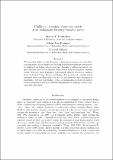Children's learning of number words in an indigenous farming-foraging group
Author(s)
Piantadosi, Steven Thomas; Jara-Ettinger, Julian; Gibson, Edward A.
DownloadGibson_Children's learning.pdf (113.6Kb)
OPEN_ACCESS_POLICY
Open Access Policy
Creative Commons Attribution-Noncommercial-Share Alike
Terms of use
Metadata
Show full item recordAbstract
We show that children in the Tsimane', a farming-foraging group in the Bolivian rain-forest, learn number words along a similar developmental trajectory to children from industrialized countries. Tsimane' children successively acquire the first three or four number words before fully learning how counting works. However, their learning is substantially delayed relative to children from the United States, Russia, and Japan. The presence of a similar developmental trajectory likely indicates that the incremental stages of numerical knowledge – but not their timing — reflect a fundamental property of number concept acquisition which is relatively independent of language, culture, age, and early education.
Date issued
2014-04Department
Massachusetts Institute of Technology. Department of Brain and Cognitive SciencesJournal
Developmental Science
Publisher
John Wiley & Sons, Inc
Citation
Piantadosi, Steven T., Julian Jara-Ettinger, and Edward Gibson. “Children’s Learning of Number Words in an Indigenous Farming-Foraging Group.” Dev Sci (April 2014): pp. 1-11.
Version: Author's final manuscript
ISSN
1363755X